#dagor bragollach
Text
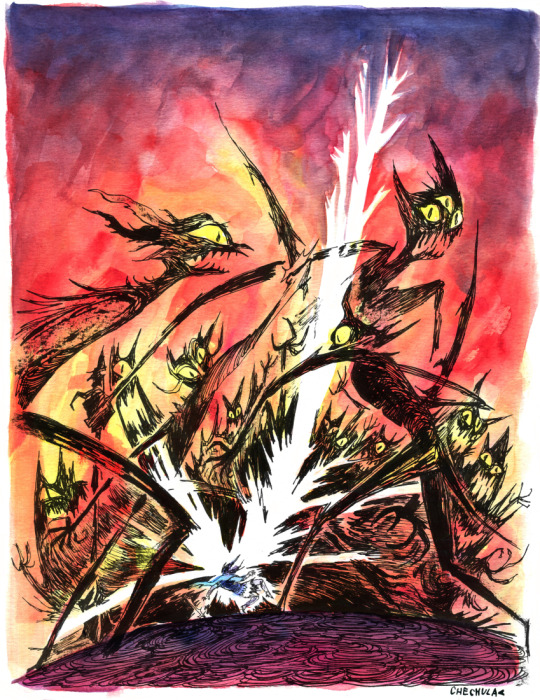
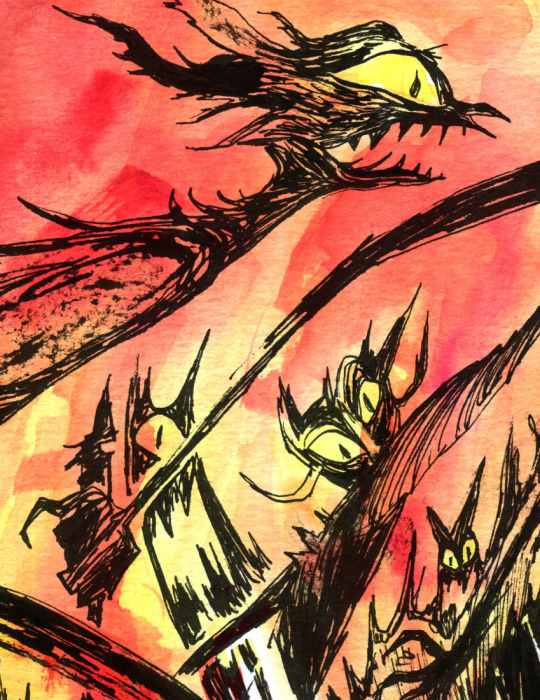
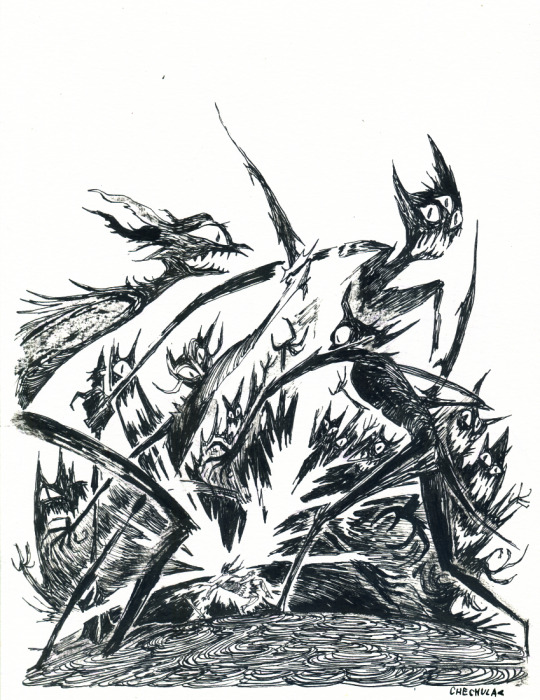
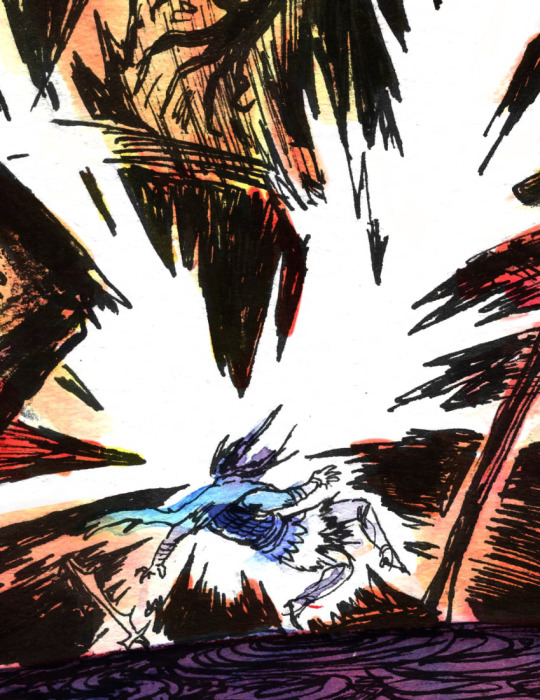
One more drawing based on a stress-relief doodle from a work meeting.
The death of Fingon. This scene is so terrible and emotional(at least makes me emotional) and once again, I couldn't find enough artwork that captures it. So I made one myself. Also here, I wanted to make light that looks like tree-branches ♥
641 notes
·
View notes
Text

The Dagor Bragollach, the first appearance of Glaurung
There will be more of these as I reread the Silmarillion and my recent purchase of Beren and Luthien...
#drawing#illustration#art#procreate#digital art#lord of the rings#lotr fanart#fanart#silmarillion#inspiration#dagor bragollach#glaurung#dragon#draw everyday
506 notes
·
View notes
Text

fingon holding finwe’s sword
#dagor bragollach#silmarillion#silmart#the silmarillion#silm fanart#silmarillion art#fingon#findekano#nolofinwions
621 notes
·
View notes
Text
There is not nearly enough said about Tolkien's ability to encompass volumes into very short sentences. Mostly because, yes the man was a master of lush descriptions and certainly he loves to wax long and poetically about stars and trees and far green fields under the wind...
But the skill with which he can pack an emotional punch into a couple of words...
Consider the following
"Then Fingolfin beheld (as it seemed to him) the utter ruin of the Noldor, and the defeat beyond redress of all their houses; and filled with wrath and despair he mounted upon Rochallor his great horse and rode forth alone, and none might restrain him. He passed over Dor-nu-Fauglith like a wind amid the dust, and all that beheld his onset fled in amaze, thinking that Oromë himself was come: for a great madness of rage was upon him, so that his eyes shone like the eyes of the Valar. Thus he came alone to Angband's gates, and he sounded his horn, and smote once more upon the brazen doors, and challenged Morgoth to come forth to single combat. "
And the final sentence "And Morgoth came."
All of that imagery of Fingolfin coming upon Morgoth like a Vala himself and throwing down his figurative gauntlet and then the fallen Vala coming forth with just a three word sentence.
Or the entirety of the Duel of Sauron and Finrod (that is renowned) all gorgeous imagery, the Lord of Wolves against the disguised king of Minas Tirith...
"Reeling and foundering, as ever more strong
The chanting swelled, Felagund fought,
And all the magic and might he brought
Of Elvenesse into his words."
....
"The wolf howls. The ravens flee.
The ice mutters in the mouths of the Sea.
The captives sad in Angband mourn.
Thunder rumbles, the fires burn"
And the final line "And Finrod fell before the throne."
The brevity and the switch from Felagund to just Finrod, from the dwarf-given title to his Telerin-originated father-name as he falls defenseless to the reminder of the kinslaying is devastating in its simplicity.
There is a time for lush descriptions and a time for brevity, a time for gorgeous, expensive imagery and allegory and a time for literary simplicity and Tolkien knew it...
#jrr tolkien#tolkien#lord of the rings#the silmarillion#lotr#finrod felagund#fingolfin#tolkien elves#silmarillion#dagor bragollach#Tol sirion#tol in gaurhoth#tolkien fandom#tolkien musing#tolkien meta#text post#literary#beren and luthien
2K notes
·
View notes
Text
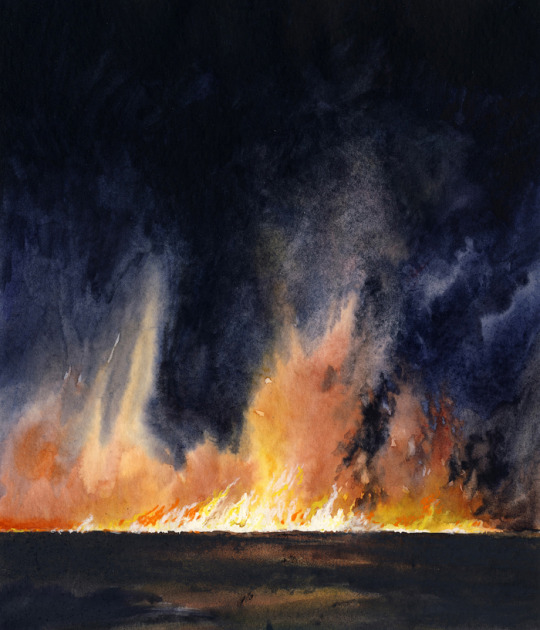
Dagor Bragollach by Marya Filatova
193 notes
·
View notes
Text
In the Silmarillion fandom, we enjoy grabbing the trope of “Nolofinwëan recklessness” and running wild with it.
The most common victims of this are Fingon the Rash Prince and Fingolfin the Impulsive King, who rushes into suicidal combat. Both father and son daring death within Morgoth’s domain.
It’s fun to write and exciting to imagine, no doubt, but I’d like to offer a different take. In fact, what makes Fingon and Fingolfin (and the rest of that family) compelling to me is their patience and endurance.
Yes, I’m aware Fingon rushes to battle at Alqualondë, but that’s a world-altering event. The light of the world has literally gone out, murder has happened in Valinor, Finwë is dead. Most of the Noldor are up on their feet and ready to depart. Everyone is rushing.
But this is not always the case with Fingon. Most significantly, the rescue of Maedhros is NOT an impulsive decision. The published Silmarillion offers no timeline on this, but in The Grey Annals, five entire years pass between the arrival of Fingolfin’s host to Beleriand and Fingon’s decision to look for Maedhros.
Five years in which the two hosts are quite literally on the verge of civil war because, let’s not forget:
No love was there in the hearts of those that followed Fingolfin for the House of Fëanor, for the agony of those that endured the crossing of the Ice had been great, and Fingolfin held the sons the accomplices of their father.
Diplomacy is a painfully slow (and absolutely frustrating!) ordeal. Fingon’s decision is born from this strife, from thirty years on the Helcaraxë, and five years of civil restlessness, not to mention the clear signs that Morgoth is ready to attack them at any moment:
Then Fingon the valiant, son of Fingolfin, resolved to heal the feud that divided the Noldor, before their Enemy should be ready for war; for the earth trembled in the Northlands with the thunder of the forges of Morgoth underground.
This is not rashness. This is the sacrifice of a captain who is willing to make the best of what time is left before full-out destruction begins. It would be rashness if Fingon got his company and crossed Mithrim to wage battle on the Fëanorians. Instead, he chooses differently for the sake of peace, stability, and renewed friendship.
The trek from Lake Mithrim to Thangorodrim could be estimated at around 150 miles, depending on the map we follow, and there are grasslands and two sets of mountains to cross, not to mention the horror of Thangorodrim. Fingon travels on foot. It would take him weeks, maybe even months, to find Maedhros. Plenty of time for the fire of rashness to cool down if that was the case. But he persists because he has no other choice.
Similarly, I often see takes on Fingolfin that he rushes to pointless combat with Morgoth in the same manner as Fëanor had done. Yet again, the timeline is crucial here. The published Silmarillion has the battle lasting at least several months. Bragollach starts in F.A. 455 during winter time:
There came a time of winter, when night was dark and without moon
The battle slows down presumably a few months later:
but the Battle of Sudden Flame is held to have ended with the coming of spring, when the onslaught of Morgoth grew less.
The onslaught grows less, but it doesn’t fully cease. Morgoth and Sauron reissue their attacks early into Fingon’s kingship.
In the Grey Annals, the timeline is stretched further out:
Year 455:
The Fell Year. Here came an end of peace and mirth. In the winter, at the year's beginning, Morgoth unloosed at last his long-gathered strength
Year 456:
Now Fingolfin, King of the Noldor, beheld (as it seemed to him) the utter ruin of his people, and the defeat beyond redress of all their houses, and he was filled with wrath and despair.
The fighting goes on actively anywhere from a season to a full year! Fingolfin tries to hold his kingdom together for a full year despite an absolute, unquestionable disaster. I mean, look at this description of the battle:
In the front of that fire came Glaurung the golden, father of dragons, in his full might; and in his train were Balrogs, and behind them came the black armies of the Orcs in multitudes such as the Noldor had never before seen or imagined. And they assaulted the fortresses of the Noldor, and broke the leaguer about Angband, and slew wherever they found them the Noldor and their allies, Grey elves and Men. Many of the stoutest of the foes of Morgoth were destroyed in the first days of that war, bewildered and dispersed and unable to muster their strength. War ceased not wholly ever again in Beleriand
Fingolfin’s decision to ride out, again, is not out of recklessness or a spur-of-the-moment decision. It’s everything but that. He has given everything and truly believes it’s all lost: “the utter ruin of his people, and the defeat beyond redress of all their houses.” (!!!)
This is a final stand, the King’s duty to stand by his people, even in death.
#fingon#fingolfin#maedhros#rescue of maedhros#dagor bragollach#close reading#silm#silmarillion#tolkien#long post#cw: war#cw: death
366 notes
·
View notes
Text

Dagor Bragollach.
#tolkien#silmarillion#elves#watercolour#watercolor#noldor#tolkien sketch challenge#jrr tolkien#silm art#dagor bragollach#ard-galen
218 notes
·
View notes
Text
Fouled Water
(Caranthir, rated G)
The moment Caranthir had seen Maedhros’ map of East Beleriand, he had known why his eldest brother was sending him to Thargelion. It was a banishment of sorts; save for Ossiriand to the south, where their youngest brothers would be safer and of better use, Thargelion was the furthest from Dorthonion, and thus the furthest from Angrod and Aegnor.
Caranthir knew it was his own fault for lashing out at Angrod during that ill-fated council meeting, though he was too proud to ever admit it aloud. He’d made a mess of things, and Maedhros’ rebuke, though firm, hadn’t been enough to salvage the situation. But it was just so difficult to stay calm around Finarfin’s children -- all of them, really, but Angrod in particular. Being in a room with him was like being pummeled by something sharp and hard, like the hailstones that sometimes fell in Mithrim’s chill northern winters, and Caranthir could stand it for only so long.
You don’t understand, he wanted to say to Maedhros. I didn’t ask to be this way. I didn’t ask to feel what everyone around me feels. If I could change it, don’t you think I would? But he held his tongue. His brother had enough things to worry about, and Caranthir couldn’t help feeling guilty that he had added yet more weight to Maedhros’ burdens. So he accepted Thargelion without complaint. At least the place had a lake, which was more than could be said for any of his brothers’ lands.
Though Caranthir loved to swim, he’d never cared for the ocean. It was too salty, too gritty, too abrasive, and the violence of the sea during their voyage in the stolen swanships still haunted him. He’d been certain that he would be shipwrecked and drowned in the briny depths, as had happened to so many of his father’s followers. Even now, he half wondered if Uinen might rise against Fëanor’s sons in wrath once more if they ventured to the coast.
But Helevorn was utterly unlike the ocean. Though strong winds could raise swells on its surface, when the air was calm, the lake was as smooth and still as the glass for which it was named. And though it was dark and deep -- so deep that he’d run out of rope on his first attempt to measure it -- the water was pleasingly cool and clear. Floating on his back, hearing nothing but the peeping of the sandpipers and the plaintive call of the nearby loons, he finally felt at peace.
Now his lake is dead. Some foul concoction of Morgoth’s has turned the water murky and acidic. The weeds have withered, and putrid fish and the feathered carcasses of birds bob on the surface, floating between patches of burning oil. His fortress on Mount Rerir, too, is in flames, but his eyes sting more for the loss of Helevorn.
It’s the smoke, he tells himself, though he knows it’s a lie. It’s just the smoke irritating your eyes.
Blinking away the tears, he turns his horse to the south. There is no one left to wait for. Everyone who could escape Morgoth’s deadly host has already fled, making their way to Ossiriand with all haste. Only Caranthir and his rear guard remain.
“Move out,” he orders, his voice rough from the smoke. “There’s nothing more we can do here.”
He leads his soldiers in their retreat, and he doesn’t look back.
#caranthir#dagor bragollach#the silmarillion#silmarillion fanfiction#silmarillion writers' guild#silm fic#silmfic#tolkien fanfic#tolkien#silmarillion
168 notes
·
View notes
Text
Then Fingolfin beheld (as it seemed to him) the utter ruin of the Noldor, and the defeat beyond redress of all their houses; and filled with wrath and despair he mounted upon Rochallor his great horse and rode forth alone, and none might restrain him. He passed over Dor-nu-Fauglith like a wind amid the dust, and all that beheld his onset fled in amaze, thinking that Oromë himself was come: for a great madness of rage was upon him, so that his eyes shone like the eyes of the Valar. Thus he came alone to Angband’s gates, and he sounded his horn, and smote once more upon the brazen doors, and challenged Morgoth to come forth to single combat. And Morgoth came.
And Morgoth came.
AND MORGOTH CAME.
Tolkien could have ended this paragraph in so many different ways. But he chose this short, ominous sentence - I absolutely love how it doesn't really seem to match the rest of the narrative but it kind of still fits?
Screaming crying throwing up about Fingolfin's desperate attack. It hits so hard every fucking time.
#tolkien#silmarillion#silmarillion daily#fingolfin#morgoth#dagor bragollach#my constructive commentary about the book: this sentence. I like it.
94 notes
·
View notes
Text

sudden flame
126 notes
·
View notes
Text
Fen of Serech (redraw)
'...that yet for a while in Beleriand rivers may run clean, leaves spring, and birds build their nests, ere Night comes.'

#traditional art#tolkien#noldor#elves#silmarillion#finrod#edrahil#edain#beren erchamion#barahir#dagor bragollach
102 notes
·
View notes
Note
For the 5 sentence prompt if you feel like it:
Fire cascaded down the mountains.
First the plains burned. Then the forests. The rivers. Hope itself.
Amid the flames: laughter and screams and hoofbeats.
#silmarillion#tolkien#silm fic#dagor bragollach#ask game#melestasflight#stormwritten#after five responses packed full of run-on sentences I thought this was a good prompt to go laconic#farewell to the valiant warlord
18 notes
·
View notes
Text
In the fire, Finrod watches all his affection and love for Turgon burn into ashes.
He sits, and Eliril chief healer works on the worst of his wounds. She pulls an arrowhead from his swollen flesh, but Finrod does not even let out even a grunt of pain.
He is too numb now for that.
Dorthonion is no more; he felt his brothers die. And as the orc dragged him by the hair—all that golden hair, fallen into the mud, hewn from his scalp— as a prize, he wonders.
He wonders where Turgon is.
He wonders why he did not come.
The only thing Barahir manages to save from Dorthonion is an old, worn, spotted seal plush toy that Aikanár took all the way from Aman. It is a miracle it even survived.
But Finrod wonders
He wonders, still, even as he takes his worn and battered surviving soldiers back on the road south.
He wonders, still, as he wears the robe of mourning and declares Nargothrond’s lights to be dimmed, for music to cease, and no feast be held for a year.
The mourning is a year, but Finrod knows he will mourn forever.
He watches the hearth fire, and all his love and affection for Turgon burns into ashes.
#my drabs#silmarillion#finrod#findarato#turgon#turukano#golden poster boy#silm#aegnor#aikanaro#dorthonion#dagor bragollach
49 notes
·
View notes
Note
I wish you would write a fic where Maglor is injured after the Dagor Bragollach and Maedhros has to tend to him!
Wish granted, Anon! :D
The Gap to Himring (2026 words) by StarSpray
Chapters: 1/1
Fandom: The Silmarillion and other histories of Middle-Earth - J. R. R. Tolkien
Rating: Teen And Up Audiences
Warnings: Graphic Depictions Of Violence
Relationships: Maedhros & Maglor (Tolkien)
Characters: Maedhros (Tolkien), Maglor (Tolkien), Original Characters
Additional Tags: Dagor Bragollach, Gap Filler, Hurt/Comfort, Battle, Major Character Injury
Series: Part 14 of Wisdom of the Evening Star
Summary:
Maglor makes it within sight of Himring before his horse is cut out from under him.
14 notes
·
View notes
Text
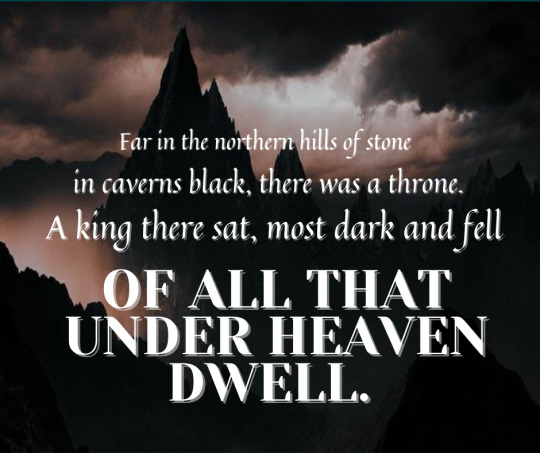








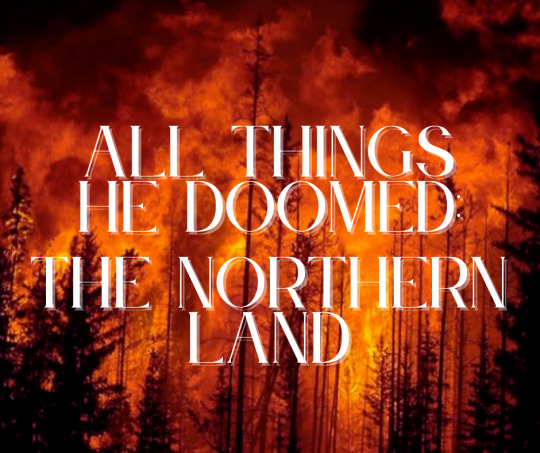
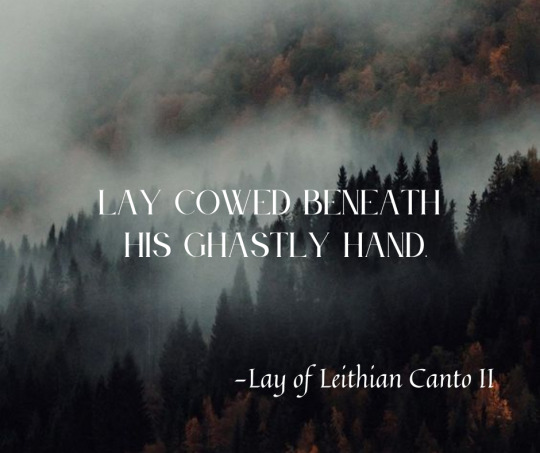
Leithian Series Part 2: Of Morgoth Bauglir
<<< Part 1. Part 3 >>>
#already made a post of this particular part of the leithian about Morgoth#but decided to redo it in this style as part of my leithian series#you legit have no idea how long I've had a tune for this part of the leithian in my head#like you know how in the lotr films some of the soundtrack has elvish sung in the background?#i would have these lines be a part of Morgoth's theme if a B&L adaption ever happened#leithianedit#silmedit#tolkienedit#silmarillion#tolkien#leithian#morgoth#melkor#beleriand#angband#dagor bragollach#valinor
36 notes
·
View notes
Note
I considered not being predictable but I’m gonna. Maedhros and fire? 💕
the world burns.
people shout - you shouted too, just a minute ago. it is unbearably hot, and the air smells of burnt flesh and hot rock, but you have to keep cool; you have to subdue the fire within you, have to resist its call to burn and to kill. your position is priceless. you cannot let the Enemy take it from you; you see, in your mind, various plans and plots on how to strike back, how to regain your land, how to drive back the forces that seek to destroy you. you grip your teeth and swing your sword.
it's hot.
himring is strong behind your back, and you know its walls will keep you safe. you strike and you wound and you kill, and it is so unbearably hot, and yet you do not retreat. cannot retreat. will not retreat.
you seek your brother in the chaos, brush his mind, and he burns. you falter for a mere second, and you're glad your guard is there, striking the orc who would inevitably strike you; your brother's mind pounds with pain and fear and panic, and he clings to you, seeks you - it is disorienting, and you have to grit your teeth not to go berserk there and then - and it's hot, so unbearably hot, and your blood boils, but-
(stay alive, you order him. stay alive no matter what. make your way to me. find me. i will hold the gates for you.)
you rip yourself back to the reality. the world is falling apart, but you will hold it together for your brother as long as you can; and that means you bend and you strike and you burn, one with the chaos around you, and your people burn with you.
come to me, you repeat once again, when all feels over, and your brother falls into your arms.
#sorry it's so short!! there were some ideas in my mind but i settled on this#maedhros#maglor#silm fic#tolkien#dagor bragollach#himring
49 notes
·
View notes